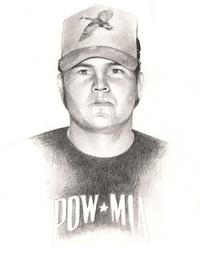
Alternet: ' The Marine Who Saw Too Much.
A former lance corporal explains why he intentionally failed a drug test to avoid going back to war-torn Iraq.The following text is an excerpt from Peter Laufer's new book, Mission Rejected: U.S. Soldiers Who Say No to Iraq (Chelsea Green, 2006).
Recruiters convinced a listless Californian named Daniel to join the Marines. On September 11, 2001, he was taking classes at a junior college near San Jose while holding down two jobs: managing a PurWater store and squeezing fruit at a Jamba Juice stand.
His patriotism combined with the recruiters' sales pitches convinced him to drop out of school two units short of his associate's degree. By the next summer he was in boot camp. When we meet, the 23 year-old ex-Marine asks me to restrict my identification of him to his first name; he's fighting the Veterans Administration for benefits and the Marines for an honorable discharge, and he fears publicity may hurt his case.
Daniel is slouched in his chair when we first start talking. He's wearing a camouflage baseball cap with the image of a Canada goose on its front. His black T-shirt carries the legend POW-MIA you are not forgotten. His forearms are covered with tattoos. His blue jeans are well faded and his black cowboy boots well worn.
"I decided my country needed me and I was pretty fit," he says about his decision to join the Marines after the attacks on the World Trade Center and the Pentagon. "I decided to go do my part. I wasn't sure what branch until I walked into the recruiting office and a Marine Corps office was before all the other ones. They kind of pulled me in, told me all their jarhead jargon, and filled my head with a whole bunch of good stuff. I was sold quickly."
Daniel speaks fast, with a slight twang and the hint of a stutter. He says his childhood stutter returned as a symptom of his combat-related post-traumatic stress disorder.
By February 2003, Daniel was trained as a radio operator and was the proud owner of a brand new Dodge Ram 1500 truck. A week after he bought the truck, he was told he was being deployed to the Middle East. "There goes my truck payments," he remembers thinking. But he parked the pickup and managed to keep the payments current while he saw the other side of the world. "It was a pretty scary time," Daniel says about his three months on a ship, patrolling Kuwaiti waters during the initial U.S. assault on Iraq.
Rotated back to the States, Daniel hopped back into the Dodge and unwound. "Came back over stateside, happy to be back. Spent all my money and had a good time. Early in 2004 we was back in the desert. This time I went directly into Iraq." He found himself on an assault boat, patrolling for "insurgents." His unit saw action in the toughest neighborhoods throughout much of 2004, often beaching the boat and joining forces with land-based troops in hot spots like Fallujah. "Pretty scary, that's all I've got to say about that," Daniel says regarding Fallujah, his speech turning percussive. "You never know when it's your time to go. Explosions from mortars going off all around you. Shots fired. You try to keep your head up. Trust the guy next to you. That's about it."
Fighting in the war flipped Daniel's political beliefs. "I came back very anti-Bush. I used to be a Republican before I joined the military. Not any more." His experiences on the ground, he says, convinced him he'd been lied to. The Iraqis "are a defeated people," he says, not a threat to America. "It's a third-world country. These people walk around with no shoes, nothing. These guys are working for a dollar a day. The military would pay the village people to come on base and build sandbags so that they can be more comfortable in their tents and pay them a dollar a day, and these guys will work making seven dollars a week just to feed their family."' Lees verder: http://www.alternet.org/story/36898/ Of: http://www.truthout.org/docs_2006/061506P.shtml




Geen opmerkingen:
Een reactie posten